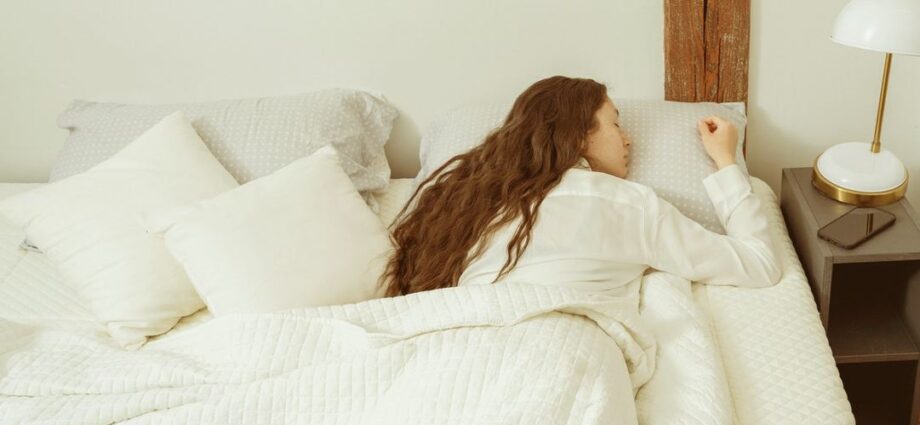Waking up for a longer duration of time after going to bed is a common problem among a large section of the population, this can be either due to a bad bed problem or that your brain is not ready to relax. It can also mean the initiation of mental issues which can again turn out to be serious mental issues in the future. So what are these wide range of reasons that basically do not let you sleep properly at night? Here are those reasons with an explanation.
Common Reasons You Cannot Sleep Easily
Stress
There are many different reasons why people cannot sleep, but one of the most common is stress. Chronic stress increases blood pressure, triggers the fight-or-flight response, and floods the blood with stress hormones. All of these things keep us awake at night. It’s no wonder that so many people find it difficult to sleep.
Pregnancy
Sleeping is a must for pregnant women. During the first trimester, pregnancy can cause a few extra hours of sleep. But the sleep-deprived mom-to-be will need to supplement her nighttime rest with naps. This is because her body is inundated with hormones. Pregnancy also affects the uterus, so sleep is important for the developing baby.
Medications
There are many different types of sleep disorders, but they can all be linked to certain medications or supplements. Overstimulation or other side effects of drugs and supplements can disrupt sleep, causing a host of problems. People who suffer from depression, chronic pain, anxiety, or other health conditions may have difficulty falling or staying asleep. To help identify these problems, keep a sleep diary. If you are having trouble falling asleep or not sleeping, speak to your physician.
Cluttered Sleep Environment
A cluttered room may not be attractive or comfortable, but a cluttered mind can be just as disruptive to sleep. According to the American Psychological Association, one of the top reasons for a lack of sleep is stress. One way to avoid stress is to put unfinished work in a basket or to the side. Avoid checking email or social media in the evenings, and keep your bedroom tidy at night.
Limiting Phone Time
You can start by limiting your smartphone use in the evening. You can set a timer and limit its use before bed. Put it in a different room or invest in blue-light blocking eye glasses. You can also limit its use in the car. These suggestions will assist you in falling asleep faster and remain asleep for longer. One of the most common reasons why people cannot sleep is due to their smartphones.
Changes In Health
Changing health can also affect sleep. Chronic pain, anxiety, and depression can all interfere with sleep. Certain conditions, such as sleepless legs syndrome and sleep apnea, are associated with more difficulty sleeping. As people age, the risk of insomnia increases, as do prescription drugs. Children and teens can also have trouble sleeping if their internal clocks are delayed or they have other health issues that interfere with sleep.
After properly analyzing the reasons for what really doesn’t let you sleep here are some tips that would actually help you fall fast asleep.
Tips to Help You Fall Asleep
Avoiding Screens
A few ways to avoid screens when you can’t sleep are to turn off your phone or tablet and read a real book. Bright screens can disrupt the natural rhythm of our body and can delay the production of melatonin by up to two hours. This is especially true for young children whose eyes are particularly sensitive to blue light. Lack of sleep affects mood, behavior, and academic performance. Research has also linked inadequate sleep to obesity and depression.
The idea of following all these processes is to get a good comfortable sleep but is it good to sleep six hours only? As an adult healthy body usually needs 8-10 hours of sleep to function in a proper manner
Avoiding activities that make you more alert
There is a study that proved that working 12-hour night shifts is not a good idea – people who slept well during the day were not as alert as those who worked 12-hour shifts at night. Researchers from Finland found that monotonous work affects alertness just as much as sleep loss. Reserve stimulating tasks for when you are tired and switch to more stimulating responsibilities when the time comes. Drink enough water and eat foods which are high in water.
Journaling
Whether you’re suffering from insomnia or simply feel stressed, journaling before bed can help you get to sleep. It helps you process the stressful events in your life and release some of the tension that may be keeping you awake. There’s no need to write War and Peace – just write about whatever is troubling you.
Journaling when you can’t sleep will help you get to sleep by calming your mind and restoring emotional balance. This is especially important if you struggle to fall asleep because sleep disturbances are associated with anxiety. Mental hyperarousal, on the other hand, contributes to insomnia. It keeps you awake at night. It will take you a little longer to complete your journal but the benefits will be worth it! In this way, journaling can help you fall asleep faster, too!
Getting Back Into Bed
Getting back into bed when you can’t sleep is a common problem. In fact, sleep specialists recommend that you get out of bed at least 20 minutes before you need to sleep. By staying in bed, you’re likely to confuse sleep with wakefulness and end up with a recurring problem. Instead, try to engage in a relaxing activity, like taking a warm shower or bath. A relaxing activity is important because it signals to your brain that it’s time to sleep.
For twenty minutes after you wake up, stay out of bed. Watching the time will only make you feel more anxious. Instead, do something else in the dim light, such as reading a book or watching TV. Avoid looking at the clock – this will only increase your worry factor and delay your sleep. The next day, try a new activity. It’s important not to lie in bed too long, but just enough time to make sure you’ll fall asleep.
Organizing Your Bedroom
If you can’t sleep at night, it’s probably because your bedroom is cluttered. Clutter can make you stressed and disrupt your sleep. To have a better night’s sleep, make sure your bedroom is organized. Here are some tips to get your bedroom organized.
Keeping your bedroom clutter-free is a great way to increase your quality of sleep. Research shows that a clean, organized bedroom is associated with better sleep. This is not just a coincidence! People who like to keep their bedrooms tidy may also benefit from improved sleep. It’s also a good way to reduce your stress levels. If you don’t have the time to organize your bedroom, consider making it more attractive to you and your partner. While organizing your bedroom and making it clutter-free you might come across mattresses that are about to be disposed of. There are mattress disposal guides that would basically help you address the mattress disposition process in a smooth organized manner.
Conclusion
Several reasons can make it difficult to sleep, such as the stimulation of the circadian rhythm or disruption of the melatonin release. It is also believed that teens who are exposed to blue light are more likely to wake up earlier in the morning. The effects of blue light are not limited to the human eye, as other factors such as sleep deprivation and eye strain can also make sleeping difficult. There are several ways to counter these effects, including dimming screens and using special glasses, and other fruitful measures mentioned above.










Comments are closed, but trackbacks and pingbacks are open.